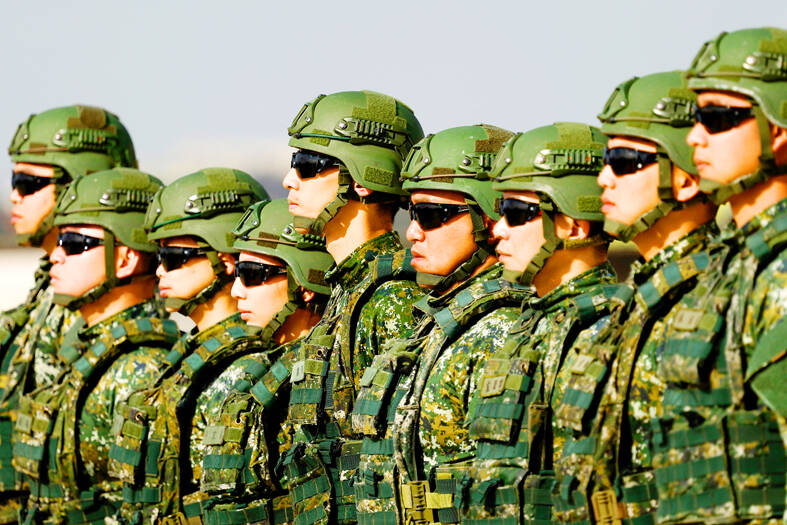A US-China expert last week urged Taiwan to increase military spending to at least match the US as a percentage of GDP, saying that it would be unrealistic to reach the White House’s 10 percent demand.
Oriana Skylar Mastro, a fellow at Stanford University’s Freeman Spogli Institute for International Studies, made the remarks during a US Senate Foreign Relations Committee hearing on Wednesday last week titled “Shared Threats: Indo-Pacific Alliances and Burden Sharing in Today’s Geopolitical Environment.”
Mastro called the situation in the Taiwan Strait unique compared with those of other US allies and partners in the Asia-Pacific region, as Taiwan is the only one facing the acute threat of war with China.

Photo: Ritchie B. Tongo, EPA-EFE
“If Taiwan expects the US to help in a conflict, thereby risking major war with China, Taiwan does need to contribute more to deterring the war, and prevailing if that proves necessary,” she said.
However, Taiwan spending 10 percent of its GDP on military spending, as suggested by US undersecretary of defense for policy nominee Elbridge Colby, is likely unrealistic, especially given that total government spending accounts for only 13.7 percent of GDP, but it must still increase military funding, Mastro said.
“As a symbolic gesture, Taiwan should spend at least the same amount as the United States on defense — currently 3.4 percent of GDP,” she said.
The money that Taiwan spends on defense should go toward buying “the right weapons,” focused on asymmetric warfare instead of traditional high-cost platforms such as submarines and F-35 jets, she said.
“Taiwan should persist in acquiring large quantities of anti-air, anti-armor and anti-ship missiles, weapons that provide more value in Taiwan’s defense scenario,” she said.
Raising spending is a “political need for Taipei to show seriousness about its defense if American lives are going to be sacrificed for its defense,” Mastro added.
The imbalance of power between Taiwan and China means that Taiwan’s ability to “hold off” long enough for US forces to arrive is “the heart of deterrence,” she said.
“Taipei will never be able to defend itself completely without US assistance,” she added.
The strategy should be for Taiwan to withstand 30 days of an invasion, while US forces arrive in the region, but the US should also take steps to convince Beijing that a quick military action has no way of succeeding, she said.
“There is no scenario in which Taiwan wins a war against China without direct US military intervention,” she added.
Within the next three to four years, the Chinese People’s Liberation Army is to tell Chinese President Xi Jinping (習近平) it is capable of taking Taiwan by force, Mastro said.
Additional reporting by CNA

‘DENIAL DEFENSE’: The US would increase its military presence with uncrewed ships, and submarines, while boosting defense in the Indo-Pacific, a Pete Hegseth memo said The US is reorienting its military strategy to focus primarily on deterring a potential Chinese invasion of Taiwan, a memo signed by US Secretary of Defense Pete Hegseth showed. The memo also called on Taiwan to increase its defense spending. The document, known as the “Interim National Defense Strategic Guidance,” was distributed this month and detailed the national defense plans of US President Donald Trump’s administration, an article in the Washington Post said on Saturday. It outlines how the US can prepare for a potential war with China and defend itself from threats in the “near abroad,” including Greenland and the Panama

The High Prosecutors’ Office yesterday withdrew an appeal against the acquittal of a former bank manager 22 years after his death, marking Taiwan’s first instance of prosecutors rendering posthumous justice to a wrongfully convicted defendant. Chu Ching-en (諸慶恩) — formerly a manager at the Taipei branch of BNP Paribas — was in 1999 accused by Weng Mao-chung (翁茂鍾), then-president of Chia Her Industrial Co, of forging a request for a fixed deposit of US$10 million by I-Hwa Industrial Co, a subsidiary of Chia Her, which was used as collateral. Chu was ruled not guilty in the first trial, but was found guilty

A wild live dugong was found in Taiwan for the first time in 88 years, after it was accidentally caught by a fisher’s net on Tuesday in Yilan County’s Fenniaolin (粉鳥林). This is the first sighting of the species in Taiwan since 1937, having already been considered “extinct” in the country and considered as “vulnerable” by the International Union for Conservation of Nature. A fisher surnamed Chen (陳) went to Fenniaolin to collect the fish in his netting, but instead caught a 3m long, 500kg dugong. The fisher released the animal back into the wild, not realizing it was an endangered species at

DEADLOCK: As the commission is unable to forum a quorum to review license renewal applications, the channel operators are not at fault and can air past their license date The National Communications Commission (NCC) yesterday said that the Public Television Service (PTS) and 36 other television and radio broadcasters could continue airing, despite the commission’s inability to meet a quorum to review their license renewal applications. The licenses of PTS and the other channels are set to expire between this month and June. The National Communications Commission Organization Act (國家通訊傳播委員會組織法) stipulates that the commission must meet the mandated quorum of four to hold a valid meeting. The seven-member commission currently has only three commissioners. “We have informed the channel operators of the progress we have made in reviewing their license renewal applications, and